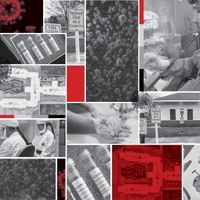Login
Subscribe404
Not Found
Is this what you were looking for?
tag higher education microbiology culture ecology

What’s the Deal with Bacterial Nanotubes?
Sruthi S. Balakrishnan | Jun 1, 2021 | 10+ min read
Several labs have reported the formation of bacterial nanotubes under different, often contrasting conditions. What are these structures and why are they so hard to reproduce?

Follow the Coronavirus Outbreak
The Scientist | Feb 20, 2020 | 10+ min read
Saliva tests screen staff and students at University of Illinois; Study ranks species most susceptible to SARS-CoV-2 infection; COVID-19 clinical trials test drugs that inhibit kinin system

Lost Colonies
Anna Azvolinsky | Oct 1, 2015 | 10+ min read
Next-generation sequencing has identified scores of new microorganisms, but getting even abundant bacterial species to grow in the lab has proven challenging.

An Ocean of Viruses
Joshua S. Weitz and Steven W. Wilhelm | Jul 1, 2013 | 10+ min read
Viruses abound in the world’s oceans, yet researchers are only beginning to understand how they affect life and chemistry from the water’s surface to the sea floor.
So They Say
The Scientist Staff | Jul 26, 1987 | 6 min read
Verbatim excerpts from the media on the conduct of science. Frank Press On Social Science Science is not a body of facts and theories, but a way of considering problems and viewing the world. Scientists observe phenomena, develop hypotheses, conduct experiments, analyze findings and generate knowledge. They may measure gamma rays or public opinion, but the process is the same. It is this process that is science. Social scientists contribute enormously to important national issues, and all of us&